Amorgorama: An Initiative Aimed at Saving the Fishing...
The attention of the global fishing...
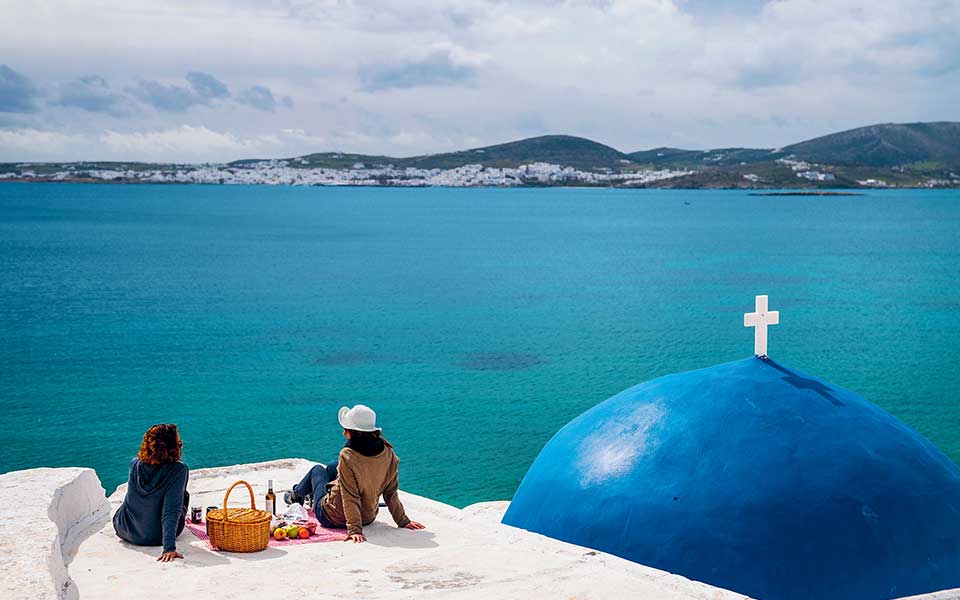
The roof of the Monastery of Ai Giannis Detis is a great spot for a picnic.
© Nicholas Mastoras
On Paros there is a goat called Akropoli. She lives in Kolymbithres, on Petra Farm and, despite her advanced years, is pregnant. Foivos the billy goat, Maria the sheep, another two goats whose names I have forgotten, and a few chickens are the farm’s main animals.
Petra Farm is the undertaking of 29-year-old British-Greek farmer Alki Downward, who, over the political sciences he studied in Washington D.C., opted instead for agroecology, dry-stone terraces and dryland farming.
“All throughout the time I lived in America, I worked as a volunteer in urban vegetable gardens. I realized that I really enjoyed it and that I wanted to work professionally in farming,” he says. Returning to Greece, he studied for a postgraduate degree in sustainable farming at the Mediterranean Agronomic Institute of Hania on Crete, and now lives permanently on Paros.
He cultivates two plots of land: one in Lefkes (5 hectares), and the other in Kolymbithres (2 hectares), where we meet him and he tells us about home composting, digging and harvesting, sage, thyme, and, of course, the capers – his great love – that he grows together with oregano along the lengths of drystone walls. In the background is the sea, the islet of Aghia Kali and the port town of Naoussa. On the balcony, a tray laden with cherry tomatoes, capers, olives and cheeses awaits us for a tasting session after the tour of the farm.
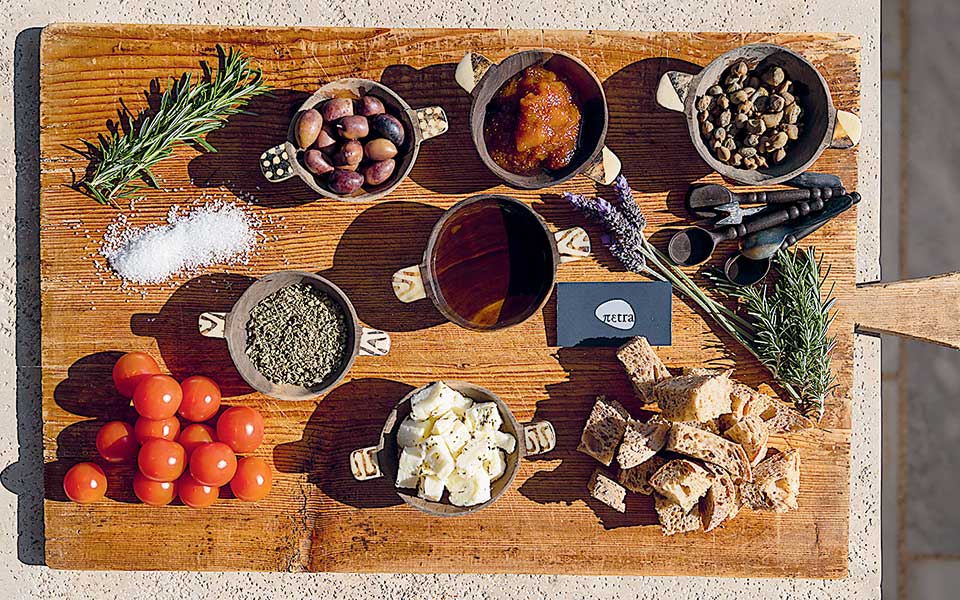
Some of products produced at Petra Farm
© Nicholas Mastoras
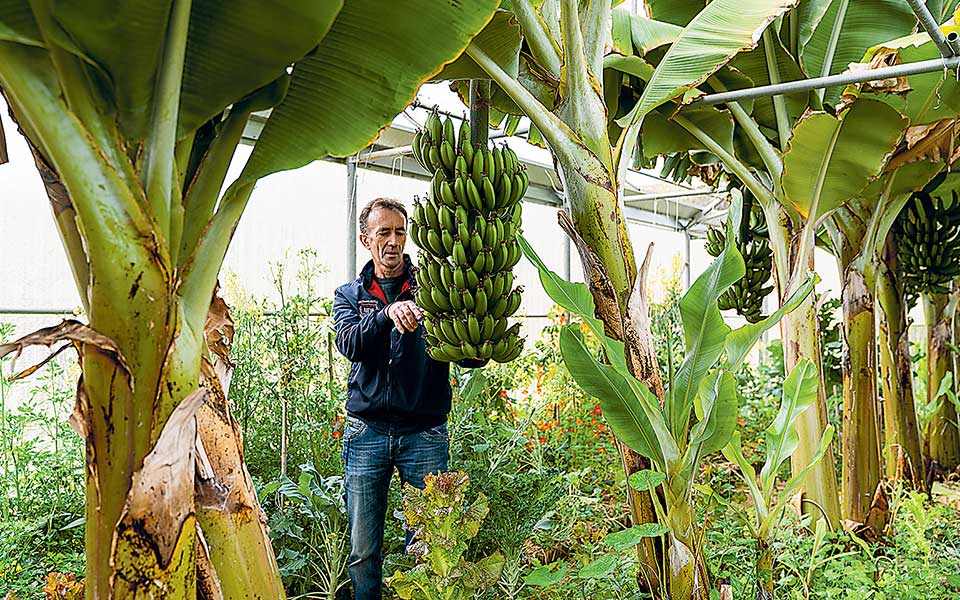
In the greenhouse of Kamarantho farm, the bananas are ripening
© Nicholas Mastoras
We are taking in a different Paros on this trip. It doesn’t have the usual bars, late nights, vodka, hangovers, searches for cabs in the early hours, and cheese pies at daybreak. We decided to not let it fill our bodies with toxins, but rather, to detoxify us.
Our visit to Petra Farm was a good stop along these lines. As was that to Kamarantho, an organic farm which is guided by the principles of permaculture (it even has a composting toilet with sawdust). It is a paradisiacal place, one with acacias, peach and fig trees, summer savory, sage, marjoram and rock samphire on which baby snails are affixed. The air is fragrant with the scent of Cretan oregano, which is better adapted to the environment than the northern Greek variety. The banana trees are thriving in the greenhouse, which makes for a lovely spot for an unusual breakfast.
With Michalis, who works on the farm as our guide, we try physalis fruit (aka ground cherries – a bittersweet fruit with a peculiar taste), kale and nasturtium leaves and flowers. The nibbling continues, more formally, at the kiosk with “souma” (a local type of pomace brandy), bread, and aromatic Koroneiki variety olives.
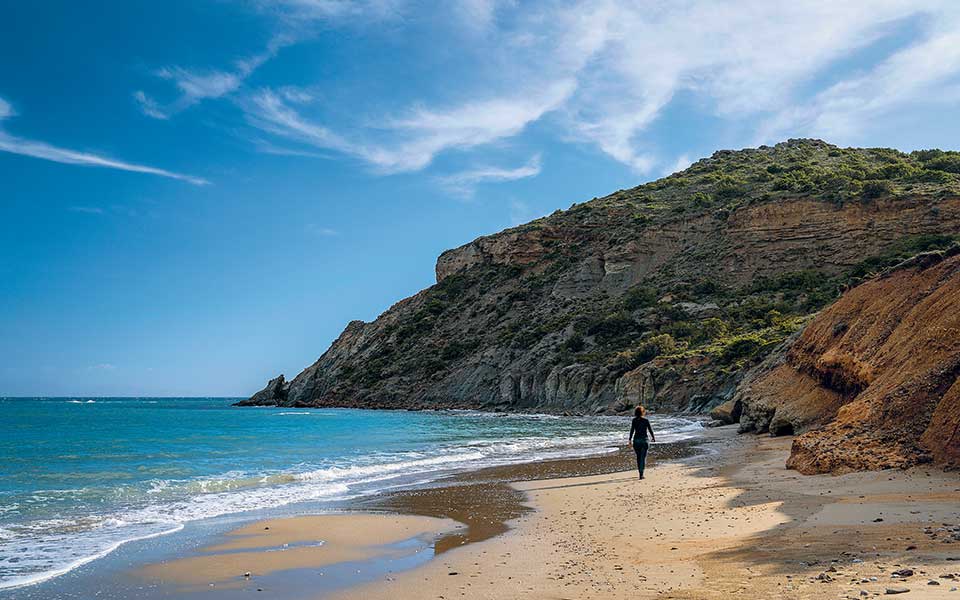
Kalogeros Beach on the eastern coast of Paros. In the summer, fans of mud therapy visit for a natural spa treatment
© Nicholas Mastoras
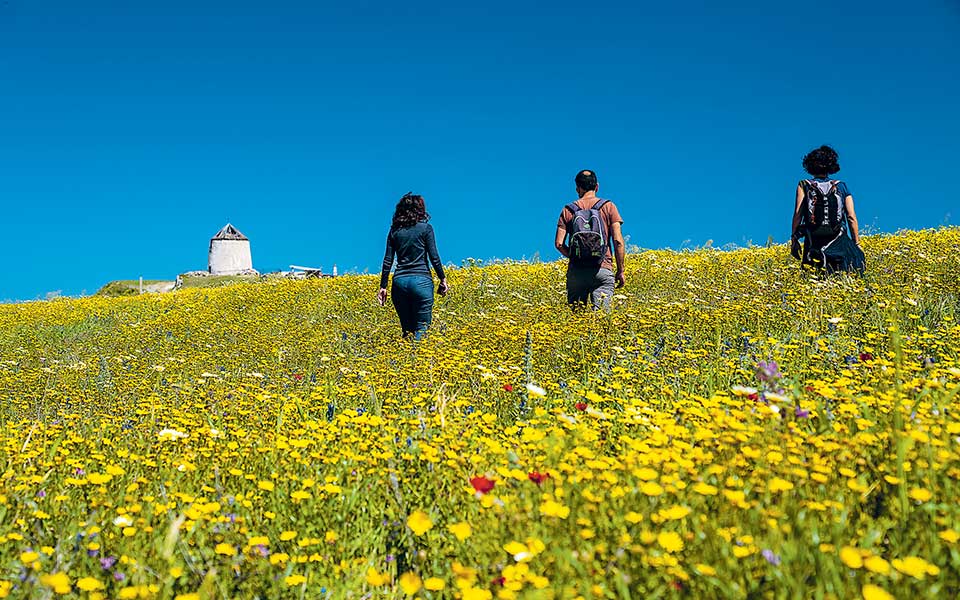
Hiking through the springtime landscape outside of Lefkes
© Nicholas Mastoras
Paros in the spring and early summer – especially this year after a particularly wet winter – is a revelation. It’s as green as a Swiss valley, with endless fields of daisies and enormous cows with black spots who look at you grumpily and moo. It’s a land of abandoned windmills on the crests of hills, threshing floors and forgotten wine presses.
Christoforos, from Paros Hikes takes on the task of guiding us on a four-hour hike around the village of Lefkes. The tour starts with a lesson in the area’s history, and we are told about the pirates, the inhabitants of Lefkes who have roots from Crete, the Byzantine path paved with marble and gneiss, and more.
But soon botany becomes the focal point, and we discuss everything we see around us: the juniper, which smells like denim and was used for roof beams in traditional architecture; the therapeutic pink rock rose which the god Ares would give to wounded warriors, and Aphrodite to women with menstrual pains; the Teucrium polium (felty germander) which cleans the urinary system; and the Jerusalem sage – known locally as “pipilia”, meaning “suckle”, as Parian children often pick the flowers to suck out the nectar at their base. As we walk we take care to avoid stepping on the pink orchids that have bloomed here and there.
Time passes swiftly as we walk. The weather is somewhat fickle, like a spoilt child that is at times radiant, and darkens moodily at others as if in a sulk. We bid farewell to Christoforos and leave the meadows and Lefkes, and head towards Santa Maria.
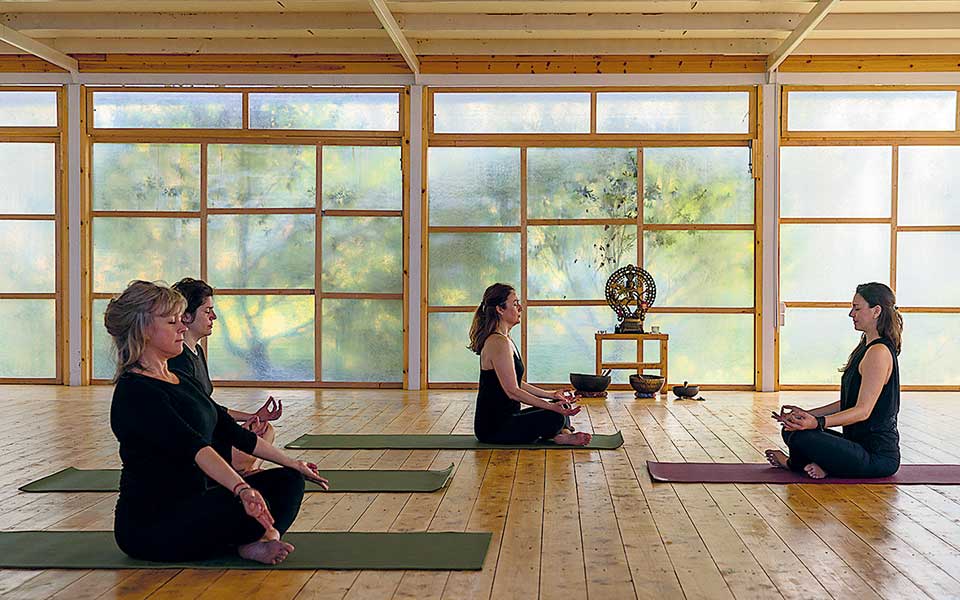
A yoga lesson at Okreblue
© Nicholas Mastoras
Here we meet yoga instructor Sasy Hasomeri at Okreblue, a holistic wellness center. Aside from the yoga lessons on offer, Okreblue features massage therapy, accommodation and a restaurant offering vegetarian and vegan cuisine where the kitchen is led by Suresh, who cooks Indian-style dishes with Mediterranean influences and vice versa (e.g. paneer tikka masala with manoura cheese, or vegetarian moussaka).
Don’t be too surprised to see an Indian running a Parian kitchen; this particular island is full of expats from far and wide, with individuals from Japan, Israel, Spain, Germany and (especially) France having taken up residence. The laid-back character of the Parians and their live-and-let-live attitude certainly have contributed to creating this cosmopolitan community, which to a large degree is to be found outside of Paroikia and Naoussa, in the smaller villages.
Back to Sasy and the yoga, We lay out the mats in the shala and begin. Up dog, down dog, tree, warrior. Breathing in through the left nostril, exhaling through the right. A finger on the third eye. My fellow classmates are more advanced than I am, but Sasy makes the lesson work for everyone. We finish with a Sirsasana, using special benches to raise our legs above our heads like experienced yogis.

A deep massage at Tao's
© Nicholas Mastoras
Afterwards we go for a massage in Ambela – at Tao’s, a center similar in sensibility to Okreblue. Evita from the Czech Republic is one of their best massage therapists, they tell me, and it would appear that they are right. She performs “deep body work” which lasts for an hour and a half and aims to treat pains that derive from injuries, stress and even childhood trauma that have been “trapped” for years in particular points of the body.
Ultra-orthodox followers of the Enlightenment who “don’t in believe in such things” and who believe that the only tool for self-awareness is rational thought, definitely need to try it. Because this type of massage requires a lot of thought. You need to be focused, to follow with your mind the movements of the massage therapist, to breathe towards the side that she directs you to, and to realize where the pains are buried in order to release them. The more at ease you are with your vulnerability, the more successful the massage will be. And when it is finished and you exit the room, you will be taller, lighter and more cheerful, with a straightened spine.
In 2018 Paros was voted the best island in Europe by the readers of Travel+Leisure at the World’s Best Awards.

Releasing a rehabilitated Eleonora's falcon back into the wild.
© Nicholas Mastoras
Therapies are a key part of a wellness trip, whether you are on the receiving end of them, or see them being provided to others. And that is what they do at Alkioni: they heal. It is moving how those running this wildlife hospital, alongside volunteers from all over the world, care for one-winged seagulls, or how they gradually release a scops owl back into the wild (they open a window so that it can come and go from its cage where it has access to food until it is ready to return to the wild).
The most impressive thing, however, is how alike birds are to people. Just as people feel stress, so too do birds, to the point that, as Alkioni’s director Marios Fournaris tells us, “the stress can kill quicker than the injury itself.”
And for that reason a visit to Alkioni is not a visit to a zoo. If one wishes, one can drop in to watch an environmental awareness video, and possibly to see some of the chronically disabled birds who are permanent residents and accustomed to people. The fortunate may even get to witness an animal being released into the wild, as we did, with Anya from Ukraine assisting a gorgeous Eleonora’s falcon return to nature.
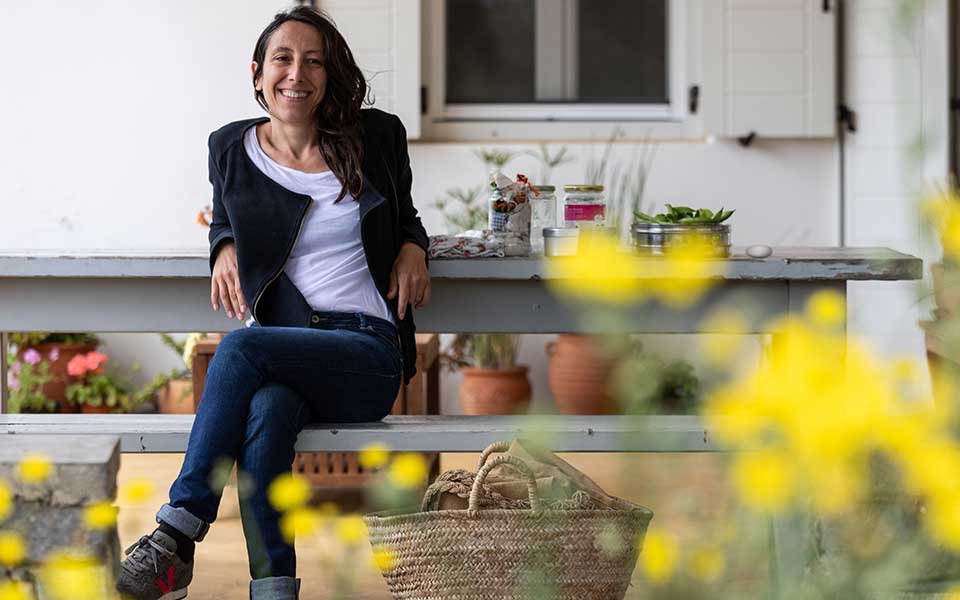
Stella, creator of the Facebook group Sustainable Living in Paros
© Nicholas Mastoras
One leaves here having absorbed all of the romantic energy of the people who are involved in healing injured wild animals. Their philosophy has much in common with that of Spanish-French Stella who lives with her partner permanently on Paros. Full of energy, well-traveled, an idealist and at the same time practically minded, Stella created a Facebook group titled “Sustainable living in Paros”, where she posts information and advice on how to live a zero-waste lifestyle, and sustainability in general.
She doesn’t use plastic bags; she buys vegetables, cheese and olives straight from crates and barrels, using her own containers; she refuses plastic straws and travels with her own coffee cup. Through her Facebook group and a soon-to-be-launched website, she offers a very good ecological guide for locals and visitors alike, with easy solutions that make a difference.
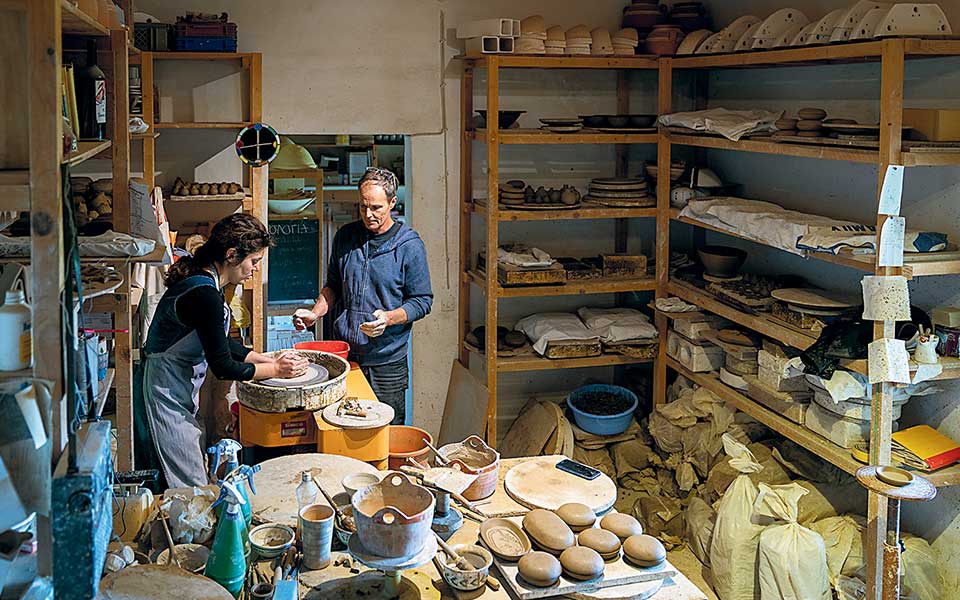
A pottery lesson at Noe
© Nicholas Mastoras
After Stella, we reach the last stop of the trip: Noah’s Ark – or rather, Noe Ceramics, the pottery workshop of the Swiss-Greek Petros Wolff in Aspro Horio which is open to all who want to try their hand at the pottery wheel. You can descend the narrow steps, and, after saying hello to his wife, don an apron, stand with your back braced against a board and learn how balls of clay resembling large uncooked meatballs are turned into cups, plates and pitchers.
You first forcefully throw the clay down, then hit the gas and try to keep it centered. You add water, make an indentation with your finger, and then gradually shape with both hands the earthenware item of your choice: a cup, a platter, a decorative fish, a saltshaker in the shape of a sea urchin, or just an amorphous mass that could be presented as a work of naif art, but is really just the misshapen ceramic of a beginner. In any case, to dirty your hands and fashion an item using just clay and a wheel is at once thrilling, and unexpectedly soothing.
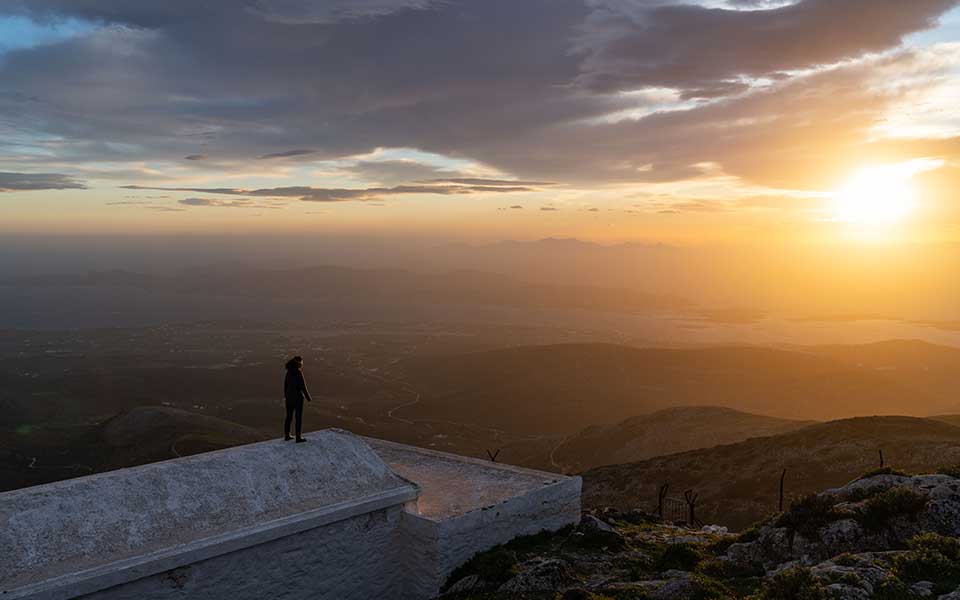
The church of Profitis Ilias near the island's highest peak - Agious Pantes (724m)
© Nicholas Mastoras
Two excursions worth putting on your itinerary are to Aghious Pantes (a chapel on the highest point of the island from where you will enjoy a magical sunset taking in the drystone terracing from above) and to Paros Park. The latter covers 80 hectares and lends itself to nature walks. It has a 7km network of signposted paths suitable for families with young children, the organized beach of Monastiri, an open-air theater, an open-air cinema with free entry, a small exhibition about the Orlov revolt – a precursor to Greece’s War of Independence and the Monastery of Ai Giannis Detis (which celebrates its feast day on 29/8), the roof of which is the ideal spot for a picnic.
The park is a protected area where hunting, grazing animals, construction and motor vehicles are prohibited, while a small botanical garden with plants native to the Aegean and Cyclades is also in the process of being developed.
Stock up: For picnics and outings in nature stock up on supplies from the small grocery stores that, aside from conventional brands, also stock organic produce both from Paros and the rest of Greece:
At Arsenis in Naoussa you will find tasty Cretan rusks made with carob flour, stuffed vine leaves in jars, and krasotyri (cheese aged in wine) from the Agricultural Cooperative of Paros.
At Bioshop pick up Parian thyme honey, cherry tomatoes from Crete and mushroom liqueur from Grevena.
Petra Farm (currently seeking organic accreditation from Bio Hellas) is open to visitors for tours and product tastings, as is the organic farm Kamarantho.
Arsenis – Naoussa +30 22840-55017
Bioshop – 1st km Paroikia – Naoussa road, tel. +30 22840-24837
Petra Farm – Kolybithres, tel. +30 6944-311988
Kamarathno – Kamari, tel. +30 6988-341929
Tao’s – tel. +30 22840-28882
Alkioni – to visit the animal hospital’s facilities in Kamares call tel. +30 6944-741616
Noe Paros – for a mini pottery lesson contact the Noe workshop Aspro Horio, tel. +30 22840-42676
Getting There
By ferry from Rafina (€31) or Piraeus (€34.50) or by plane via Olympic Air or Sky Express from Athens.
Where to Stay
Hotel Senia (Naoussa, tel. +30 22840-51700) is an exceptional hotel, luxurious but welcoming with an attractive pool and restaurant with delicious Mediterranean dishes. From €150 for a double with breakfast.
Okreblue (Santa Maria) is a good choice for those seeking simple and family-oriented accommodations in nature. Visit their website for detailed information as to the services and activites on offer (yoga, massage, etc.) €80 for a double with breakfast.
Where to Eat
The restaurant scene of Paros is generally better than ever. The Little Green Rocket (Paroikia, tel. +30 22840-27560) is a fast and friendly eatery that serves dishes with influences from around the world. (try the Thai curry with lemongrass, shrimp and rice, and the fantastic cocktail The smirk of rocket.)
The taverna Tsitsanis (Prodromos, tel. +30 22840-41375) was recommended to us by locals we met on our trip and was truly a great find, as was the ouzeri Apostoli (Paroikia, tel. +30 22840-24265) with tasty seafood.
Highly recommended was also Mediterraneo (Naoussa, tel. +30 22840-53176) with heart pasta dishes and a vegetarian platter with fava (split pea dip), beets, green beans and wild greans. Don’t leave the island without trying the PDO Parian white wine from Monemvasia and locally distilled souma (a pomace brandy).
The attention of the global fishing...
Discover hidden beaches, authentic tavernas, ancient...
The signature dish of the island...
From kafeneia serving souma and meze...